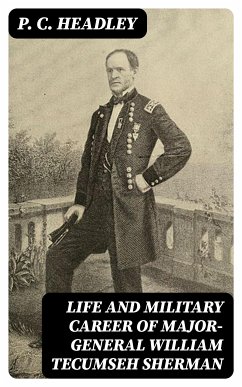
The Life of Uncle Billy - Memoirs of General W. T. Sherman (eBook, ePUB)
Early Life, Memories of Mexican & Civil War, Post-war Period; Including Official Army Documents and Military Maps

PAYBACK Punkte
0 °P sammeln!
First published ten years after the end of the Civil War, "Memoirs of General W. T. Sherman" were among the first memoirs written by one of the prominent Civil War generals. The memoirs caused a lot of controversy, especially because of the author's unfair treatment of General Grant. General Sherman replied to his critics: "...any witness who may disagree with me should publish his own version of facts in the truthful narration of which he is interested." Contents: From 1820 to the Mexican War, 1846 Early Recollections of California-1846-1848 Missouri, Louisiana, and California-1850-1855 Calif...
First published ten years after the end of the Civil War, "Memoirs of General W. T. Sherman" were among the first memoirs written by one of the prominent Civil War generals. The memoirs caused a lot of controversy, especially because of the author's unfair treatment of General Grant. General Sherman replied to his critics: "...any witness who may disagree with me should publish his own version of facts in the truthful narration of which he is interested." Contents: From 1820 to the Mexican War, 1846 Early Recollections of California-1846-1848 Missouri, Louisiana, and California-1850-1855 California-1855-1857 California, New York, and Kansas-1857-1859 Louisiana-1859-1861 Missouri-April and May, 1861 From the Battle of Bull Run to Paducah-1861-1862 Battle of Shiloh- March and April, 1862 Shiloh to Memphis- April to July, 1862 Memphis to Arkansas Post- July, 1862, to January, 1863 Vicksburg- January to July, 1863 Chattanooga and Knoxville- July to December, 1863 Meridian Campaign- January and February, 1864 Atlanta Campaign- Nashville and Chattanooga to Kenesaw- March, April, and May, 1864 Atlanta Campaign- Battles About Kenesaw Mountain- June, 1864 Atlanta Campaign- Battles About Atlanta-july, 1864 Capture of Atlanta- August and September, 1864 Atlanta and After- Pursuit of Hood- September and October, 1864 The March to the Sea--from Atlanta to Savannah-- November and December, 1864 Savannah and Pocotaligo-- December, 1864, and January, 1865 Campaign of the Carolinas-- February and March, 1865 End of the War-- From Goldsboro' to Raleigh and Washington-- April and May, 1865 Military Lessons of the War After the War
Dieser Download kann aus rechtlichen Gründen nur mit Rechnungsadresse in A, B, BG, CY, CZ, D, DK, EW, E, FIN, F, GR, H, IRL, I, LT, L, LR, M, NL, PL, P, R, S, SLO, SK ausgeliefert werden.













